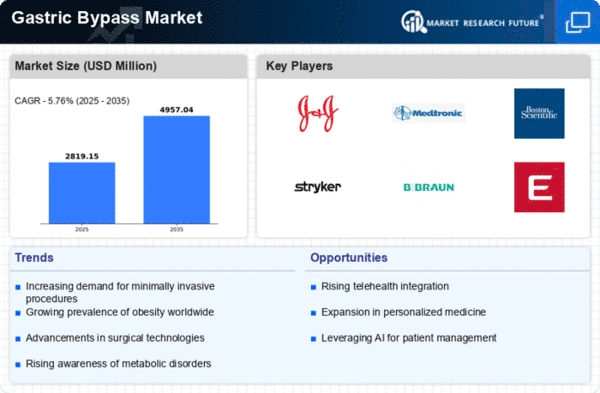Market Trends
Key Emerging Trends in the Gastric Bypass Market
It is evident that the gastric bypass market has significantly changed in recent times, reflecting a dynamic operating environment characterized by varying health care preferences and advancements in medical technologies. One outstanding pattern is the increasing rate of obesity globally leading to high demand for effective weight loss processes like gastric bypass interventions. As a result of lifestyle changes and eating habits contributing to increased levels of obesity people are now opting for surgical procedures to address health problems related to excess weight.
Technological advancements have greatly affected the shape of the gastric bypass market. Various types including laparoscopic and robotic-assisted surgeries are currently being adopted as they are less invasive with fewer postoperative complications, minimal scarring, and shorter recovery period which result from them. Such improvements have thus led to better patient outcomes as well as more candidates for gastric bypass procedures thereby expanding its coverage among larger populations.
Another critical aspect has been increased awareness about long-term benefits linked with gastric bypass surgeries. In addition to losing weight, this surgery type has been associated with amelioration of metabolic conditions like hypertension, type 2 diabetes mellitus and hyperlipidemia. A lot of scientific research keeps uncovering how useful gastric bypass can be for obesity-related comorbidities, making these operations look like an all-in-one solution towards improving wellbeing.
In addition, there has been a significant switch from technological or medical breakthroughs into personalized healthcare system that revolves around patients’ needs only. Currently, healthcare providers customize each bariatric or metabolic operation depending on these factors such as age groups including other criteria such as medical history or lifestyle etcetera of their patients. By personalizing it not only makes it an effective surgery but also results in greater satisfaction after surgery among patients while enhancing compliance with regimens of aftercare.
Furthermore, cost issues and insurance coverage are also noteworthy considerations influencing trends in the market regarding bariatric surgery treatment options. With changes in economic environments, the focus on less expensive ways of ensuring good health is more pronounced.The emerging factor around insurance coverage for bariatric surgery has been a major point of consideration for individuals planning to take this step. For this reason, the health sector is grappling with how best to integrate such operations into mainstream insurance coverage.
Similarly, there has been an increasing partnership between healthcare institutions and pharmaceutical companies in this market that aims at developing supportive therapies for gastric bypass treatments. This is because obesity is a multifaceted problem hence it calls for surgical intervention alongside other pharmacological methods as the only approach to managing weight holistically.

















Leave a Comment